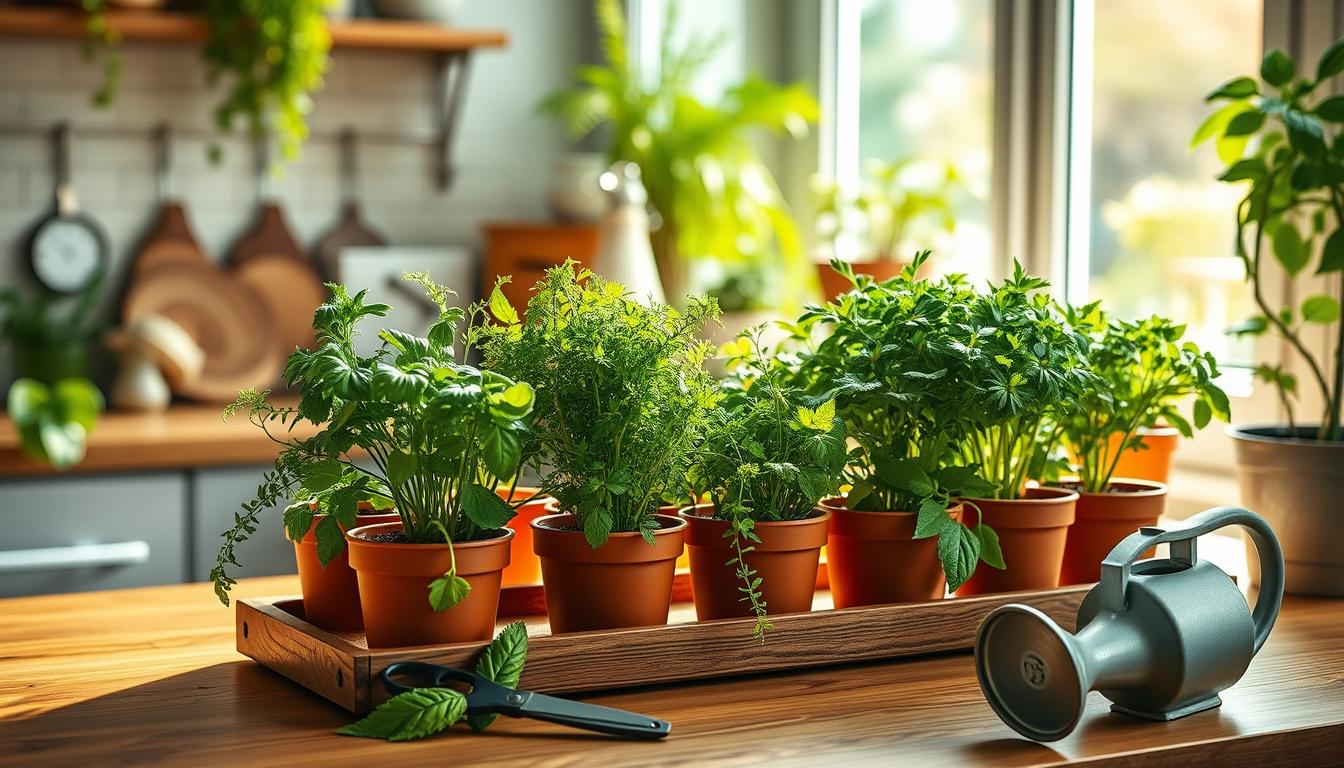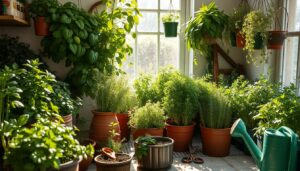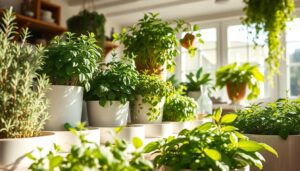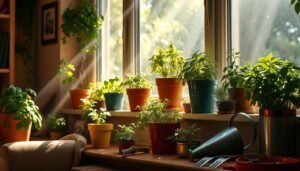Did you know 85% of Americans now grow some food at home? This rise in gardening is thanks to DIY indoor herb garden kits. They make growing fresh herbs easy for anyone, whether you’re new to gardening or a pro.
These kits offer a simple way to enjoy homegrown herbs in your cooking. They come with everything you need, from self-watering systems to grow lights. This makes it easy to start your own indoor herb garden.
Key Takeaways:
- DIY indoor herb garden kits offer a convenient and accessible way to grow fresh herbs at home.
- These kits typically include all the necessary components, from self-watering systems to specialized grow lights.
- Indoor herb gardening can be a rewarding and cost-effective way to enhance your culinary creations.
- Understanding the key considerations and options can help you create a thriving indoor herb oasis.
- Choosing the right herbs and providing the proper growing conditions are crucial for a successful indoor herb garden.
Introduction to DIY Indoor Herb Garden Kits
Growing an indoor garden is great for those who love herbs and cooking. It lets you have fresh, tasty herbs all year. DIY indoor herb garden kits make it simple to start a container garden at home.
Why grow herbs indoors?
There are many good reasons to have an indoor herb garden. It’s perfect for small spaces, like in an apartment or city home. Herbs do well in small areas, making them great for indoor gardening on windowsills or shelves. You can pick your favorite herbs anytime you want, without going outside.
Benefits of having an indoor herb garden
- Fresh, flavorful herbs available year-round
- Ability to grow herbs even in small spaces or limited outdoor areas
- Sense of self-sufficiency and connection to nature
- Cost savings by reducing reliance on store-bought herbs
- Improved air quality and natural ambiance in your living space
“Growing your own herbs indoors is a rewarding experience that allows you to enjoy the taste of fresh, homegrown ingredients year-round.”
Choosing the Right Herbs for Your Indoor Garden
When picking herbs for your indoor herb garden, think about their sunlight needs. Some love full sun, while others do well in partial sun or shade. Knowing what your herbs need helps them grow strong and tasty indoors.
Herbs that Thrive in Full Sunlight
- Basil
- Rosemary
- Thyme
- Oregano
These herbs for full sun need at least 6 hours of direct sunlight daily. They’re perfect for south- or west-facing windows. With enough sunlight, they’ll grow well and give you lots of fresh, fragrant leaves.
Herbs Suitable for Partial Sun or Shade
- Mint
- Chives
- Lemon balm
If your indoor herb garden doesn’t get much sunlight, don’t worry. These herbs for partial sun or shade do great in north- or east-facing windows. They get less direct sunlight but still do well. By knowing their sunlight needs, you can make a great indoor herb garden that adds fresh flavor to your cooking all year.
Essential Components of an Indoor Herb Garden Kit
Creating a thriving indoor herb garden is easier with a well-designed kit. These kits have key parts that help your herbs grow well together.
A self-watering system is a big part of many indoor herb garden kits. It keeps the soil moist, so you don’t have to water your herbs all the time. This is great for busy people or those new to growing herbs indoors.
Grow lights are also crucial for an indoor herb garden kit. They give your herbs the right amount of light, just like they would get outside.
- Seed starters or pre-planted herbs can give your indoor herb garden a boost, letting you start harvesting sooner.
- Special planters or containers are made for indoor use. They have good drainage, air, and the right size to help your herb garden thrive.
With these key parts in your indoor herb garden kit, you can have a fresh herb garden at home with little work.
“Growing herbs indoors is a rewarding experience that allows you to enjoy the flavors of fresh, homegrown produce year-round.”
Lighting Options for Indoor Herb Gardens
Proper lighting is key for a successful indoor herb garden. Most herbs need 4 to 6 hours of direct sunlight daily to grow well and taste great. For windowsill gardens, south- or west-facing windows work best because they give enough sunlight. But, during winter, you might need extra light to make sure your herbs get enough light.
Natural Light Requirements for Herbs
Herbs can grow in different light conditions but do best with lots of natural light. Some herbs love full sunlight, like:
- Basil
- Rosemary
- Thyme
- Oregano
- Lavender
For herbs that like partial sun or shade, try growing:
- Parsley
- Chives
- Mint
- Cilantro
- Sage
Artificial Grow Lights for Indoor Gardens
If your indoor space lacks enough natural light, artificial grow lights can help. LED and fluorescent grow lights are great for providing the herb lighting needs in dim spaces. With the right supplemental lighting, your indoor herb gardening can flourish all year.
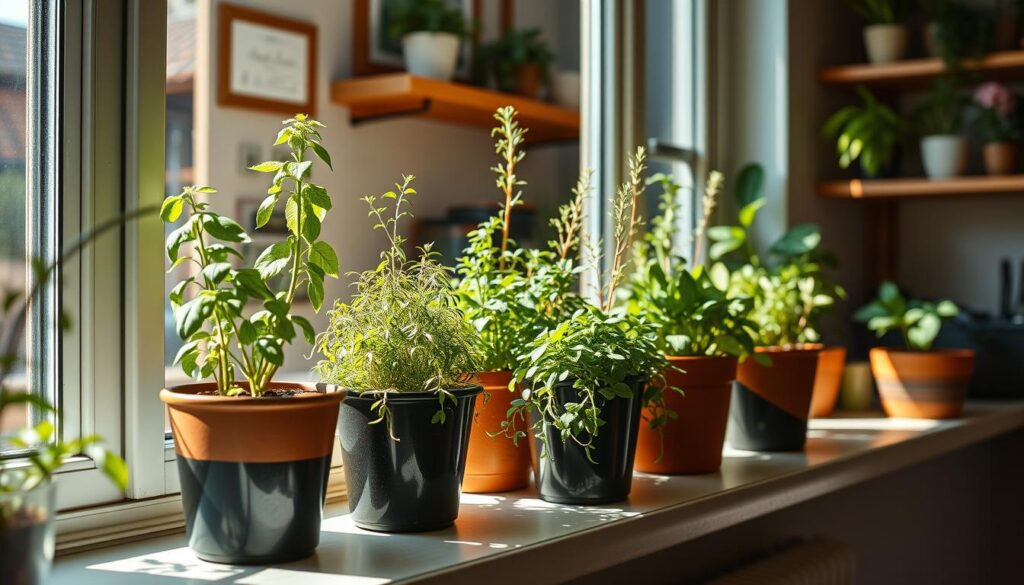
“Proper lighting is the foundation for a thriving indoor herb garden. With the right combination of natural and artificial light, you can enjoy a bountiful harvest all year long.”
DIY Indoor Herb Garden Kits: What You Need to Know
Creating your own DIY indoor herb garden kit is both fun and budget-friendly. You can use everyday items like cans or jars to make a customizable herb garden that suits your space and taste. These homemade herb gardens often have drainage holes, gravel or pebble layers for better airflow, and waterproof labels for easy identification. With creativity and the right materials, you can make a unique indoor herb garden that shows off your style and meets your growing needs.
DIY indoor herb garden kits let you repurpose everyday materials for container gardening. Instead of spending on an expensive kit, you can turn tin cans, mason jars, or old wooden crates into beautiful and useful herb gardens. This saves money and lets you tailor your setup to your space and preferences.
When making your own DIY indoor herb garden kit, think about adding features that help your herbs grow well. You might put gravel or pebbles at the bottom for better drainage and airflow, or use a customizable herb kit with built-in drainage holes. Labeling your herbs with waterproof tags or markers also helps you keep track of them and their care needs.
“With a little creativity, you can turn almost any container into a thriving indoor herb garden that reflects your personal style.”
DIY indoor herb garden kits let you be creative and try out different materials and designs. Whether you want a sleek, modern look or a whimsical, repurposed feel, you can make your own homemade herb garden unique.
Hydroponic vs Soil-Based Indoor Herb Gardens
When growing herbs indoors, you can choose between hydroponic and soil-based systems. Each has its own benefits and drawbacks. It’s key to know these before picking the right one for your garden.
Advantages of Hydroponic Systems
Hydroponic gardens use nutrient-rich water instead of soil. This leads to faster plant growth since roots get the nutrients they need directly. These gardens also have fewer pests and diseases because the growing conditions are controlled.
Benefits of Soil-Based Indoor Gardens
Soil-based gardens offer a natural growing medium for plants. They support a wide range of herbs that prefer soil. This method also connects gardeners to nature in a comforting way.
Choosing between hydroponic and soil-based gardens depends on your preferences and the herbs you want to grow. Both methods have their strengths. With some research, you can find the best fit for your indoor gardening.
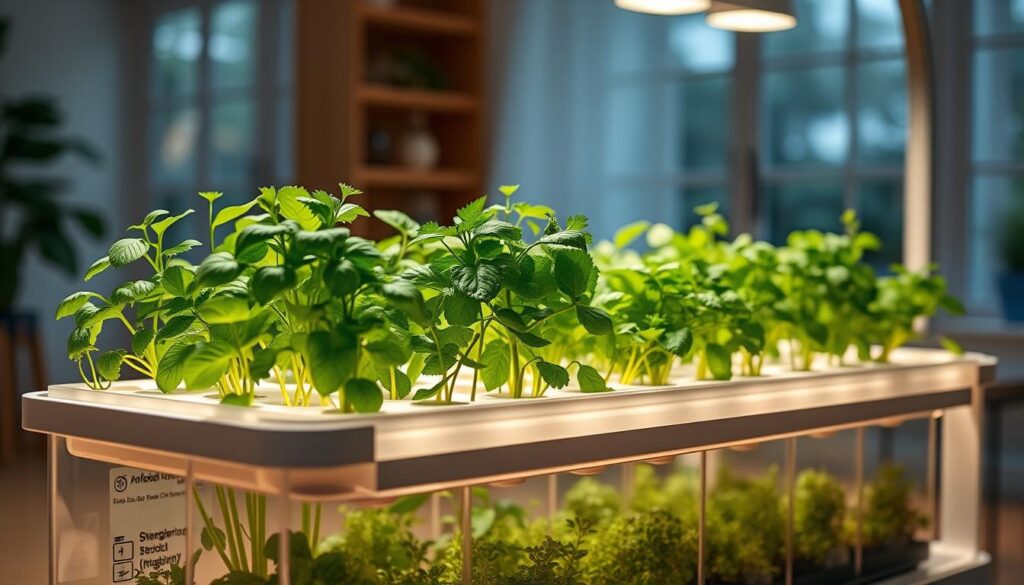
Best Indoor Herb Garden Kits on the Market
Looking to grow your own indoor herb garden? There are many top-rated products to pick from. These kits have different features to fit various gardening needs and likes.
Highlighting Top Indoor Herb Garden Kits
The AeroGarden Harvest Elite is a great choice. It’s a compact hydroponic system that grows up to six herbs or greens at once. It has a built-in timer and delivers plant food automatically, making it easy to use.
Another great option is the Amazing Creation Vertical Garden Planter. It’s a soil-based planter that fits up to 15 plants. It’s perfect for those with little space.
For a more advanced gardening experience, consider the Lettuce Grow Farmstand Nook, the Gardyn Home Kit 3.0, and the Click & Grow Smart Garden 3. These kits have features like automated watering and smart app integration. They’re great for both new and experienced gardeners.
| Product | Features | Pros | Cons |
|---|---|---|---|
| AeroGarden Harvest Elite | Hydroponic system, grows up to 6 plants, built-in timer, automatic plant food delivery | Compact design, easy to use, consistent plant growth | Limited plant capacity, higher initial cost |
| Amazing Creation Vertical Garden Planter | Soil-based, accommodates up to 15 plants, versatile design | Spacious, suitable for a variety of herbs, affordable | Requires more maintenance, may not be as compact as hydroponic systems |
| Lettuce Grow Farmstand Nook | Hydroponic system, automated watering and lighting, smart app integration | Advanced features, efficient plant growth, minimizes manual labor | Higher price point, larger footprint |
Whether you’re new to indoor gardening or have been doing it for years, these kits have something for everyone. They offer various features like plant capacity, hydroponic vs. soil-based systems, and smart technology. This way, you can find the perfect kit for your needs and preferences.
DIY Indoor Herb Garden Kit Ideas
Creating a DIY indoor herb garden is easy and fun. It’s perfect for those with little space or who love to craft. Using repurposed containers and creative designs can turn any spot into a lush herb garden.
Repurposed Containers for Herb Gardens
Get creative and turn everyday items into cute herb planters. Mason jars, tin cans, and wooden crates work great with a little tweaking. Just add drainage holes, some growing media, and labels, and you’ve got your own DIY indoor herb garden.
Creative DIY Herb Garden Designs
There are so many ways to design your herb garden. Try vertical stacks, wall-mounted displays, or hanging planters to save space and look great. Making homemade indoor herb planters or exploring DIY indoor herb garden ideas lets you mix beauty with practicality.
Start your culinary adventure with these DIY indoor herb garden kit ideas. From using old containers to creative designs, the sky’s the limit for your creative herb garden.
Maintenance and Care for Indoor Herb Gardens
Maintaining a thriving indoor herb garden needs a regular care routine. It’s important to water the soil often, keeping it moist but not too wet. Adding fertilizer, like liquid food or slow-release spikes, gives the herbs the nutrients they need to grow well.
Pruning and picking herbs often makes them grow fuller and stops them from getting too big. Keeping an eye out for pests or diseases and dealing with them fast is key to keeping your herbs healthy and productive.
- Set a regular watering schedule to keep the soil just right.
- Use liquid fertilizers or slow-release spikes to feed your herbs well.
- Prune and harvest herbs often to keep them bushy and full.
- Watch for pests or diseases and fix them quickly.
“Caring for an indoor herb garden is a rewarding experience that requires a bit of diligence, but the payoff is fresh, flavorful herbs right at your fingertips.
By following these easy steps, your indoor herb garden will flourish. It will give you a steady supply of fresh, fragrant herbs for cooking. Regular care lets your herbs reach their best potential.
Conclusion
DIY indoor herb garden kits make it easy and fun to grow your own herbs at home. By knowing what your herbs need for light, water, and care, you can keep them healthy and fresh. This way, you always have fresh herbs for your cooking.
Choosing a kit or making your own, growing herbs indoors means you can enjoy fresh produce all year. It also brings beauty and a sense of self-sufficiency to your home. With the right care, your indoor herb garden will be a source of joy and useful for cooking.
Why not start your indoor herb gardening journey now? With some planning and the right tools, you can turn your home into a kitchen garden. It will be full of the flavors and smells of your favorite herbs. Start indoor herb gardening and take your cooking to a new level of taste and happiness.
FAQ
What are the benefits of growing herbs indoors?
What type of herbs thrive best in indoor gardens?
What essential components are included in a DIY indoor herb garden kit?
How much light do indoor herbs need?
What are the differences between hydroponic and soil-based indoor herb gardens?
What are some of the best commercially available indoor herb garden kits?
How can I create a DIY indoor herb garden using repurposed materials?
What are the key maintenance tasks for an indoor herb garden?
Source Links
- How to Start an Herb Garden Indoors • Gardenary – https://www.gardenary.com/blog/how-to-start-an-herb-garden-indoors
- 12 Best Indoor Herb Gardens, Tested and Reviewed – https://www.goodhousekeeping.com/home/gardening/g36521619/best-indoor-herb-garden-kits/
- Easy and Inexpensive DiY Indoor Herb Garden Kit – https://www.myturnforus.com/diy-indoor-herb-garden-kit/


